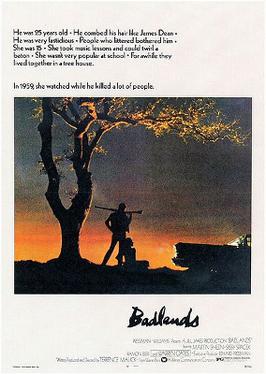Badlands (1973)
Directed and written by Terrence Malick
Runtime: 1 hr, 34 min
I first became
acquainted with Terrence Malick through the beautifully pretentious and
liberating film The Tree of Life. That movie put Malick on the “watch whatever
he has directed” list. But as I discovered,
there are not all that many films that he has directed. In fact, even though his directorial career
starts in the early 1970s, The Tree of
Life was only the fifth film under his belt. Certainly that makes him easier to catch up
on than, say, Michael Curtiz or George Cukor.
And what better place to start than at film number one, Badlands.
Loosely based on
the Starkweather homicides (thank you, Billy Joel), Badlands casts Martin Sheen as Kit, a garbage collector in South
Dakota. Kit, who’s in his mid-20s, falls
for the fifteen-year-old Holly (Sissy Spacek); the two try to keep their
relationship a secret, but when Holly’s father (Warren Oates) finds out, things
turn ugly very quickly. Kit shoots the
father, sets the house on fire, and takes off with Holly. They spend the rest of the film on the run as
Kit piles up an ever-growing body count.
With all that
murder and the constant fear of getting caught, one might expect Badlands to be an emotionally charged
film. Certainly there are a lot of
emotions bubbling below the surface, but the presentation of the film is
remarkably restrained. Spacek’s
narration throughout is delivered almost disturbingly matter-of-factly, and the
actors find themselves in a nearly continuous state of numbness. At times it almost feels like the film is a
story being told by a history teacher, rather than a tale of a crime spree.
However, while
that feeling is present, I think the presentation ultimately works to the films
advantage. Had the emotions been more visible—more
screaming and crying, for instance—then it would have certainly been more
movie-like. But the more restrained tone
allows the audience to explore the characters on a deeper level, which is more
or less the film’s goal. With very
limited amounts of action, the relationship between Kit and Holly is brought to
the forefront, and the long moments of inaction present them at default state.
The emotional
distance in Badlands is particularly
beneficial for Sheen’s Kit. There may
have been a temptation to play Kit as a sociopath. Well, he is, but Sheen doesn’t make that the
focus of his performance. His actions
may demonstrate his mental issues, but he is not defined by his bloodthirsty
ways. If anything, it’s something he’s
grows into, as Sheen’s character does not always seems aware of what he’s
doing. Further, and more importantly,
it’s not his sole motivation; his affection for Holly, after all, it what
triggers the crime spree in the first place.
Holly,
meanwhile, goes through a lot beneath her flat expressions. Initially, she is quite clearly drawn to
Kit’s whole James Dean clone persona, but there is an element of
self-deprecation in her narration as she describes life before the death of her
father. There may be genuine affection
for Kit at first, but she gradually falls into staying because, well, what
other options are there? Her face seems
to be holding back tears towards the end, and she goes from reading Kit a warm
narrative in there tree house to the dry celebrity gossip column of a magazine
on their way to the border.
The actors and
the story tend towards the subdued, and the cinematography furthers this
feel. On the one hand, some of the
sequences are absolutely beautiful: a bright full moon against a clear sky,
that one mountain way in the distance that appears ever so closer, etc. It is all so lovingly shot, yet it also
creates an overwhelming sense of loneliness (or as Kit prefers,
“solitude”). This is not to say that the
film creates the illusion of there being no way out. Rather, than gorgeousness and loneliness
combine to create an oddly blasé texture to the proceedings.
You know, the
word “indifferent” might be a good descriptor of the film. Not in the sense that I didn’t care what was
happening—or that the filmmakers didn’t, either. No, I mean that there’s no sense that Malick
or anyone else had a particular message or point to send. There was simply a story of two people to
tell, and everything else involved in the production is merely
window-dressing. This can make Badlands more than a little alienating,
but it also makes the film commendably fair and direct—no one’s beating around
the bush here.
Malick, both in
the script and on the screen, neither condemns the two fugitives nor holds them
up as some misunderstood rebels. That
may be the greatest strength of the indifferent tone of the proceedings: it
portrays Kit and Holly as people without passing judgment. I could neither root for them to elude the
authorities nor desperately want them to be caught. Again, to many viewers this might be a major
demerit—I certainly get the desire for a rooting interest—but I do appreciate
the ambiguities. In fact, that may be
all that a film needs.

No comments:
Post a Comment